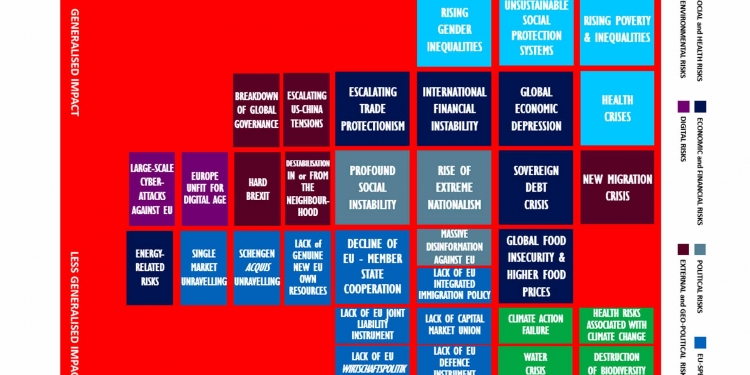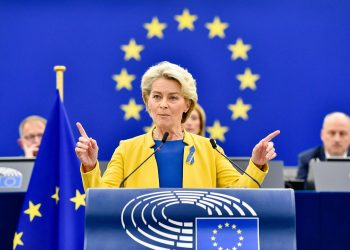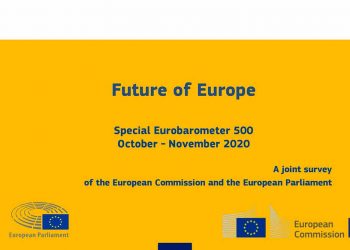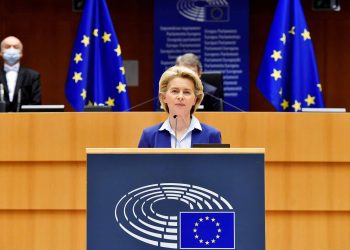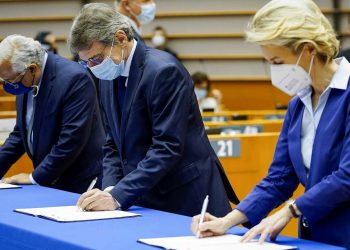Foresight really is not about the crystal ball. Strategic Foresight is the discipline of exploring, anticipating and shaping the future. European Commission adopted its first-ever Strategic Foresight Report.
EU aims to identify emerging challenges and opportunities to better steer the European Union’s strategic choices. Strategic foresight will inform major policy initiatives. It will support the Commission in designing future-proof policies and legislation that serves both the current needs and longer-term aspirations of European citizens. The 2020 Report presents the rationale for using foresight in EU policy-making, and introduces a comprehensive concept of EU resilience.
Emerging from the Crisis
The current coronavirus pandemic has further exposed the need for a greater emphasis on foresight. Coronavirus crisis emphasises the need for the European Union to devote more effort to anticipatory governance, notably through analysis of medium– and long-term global trends, as well as structured contingency planning and the stress-testing of existing and future policies. In order to contribute to reflection on, and discussion about, the implications of the coronavirus pandemic for EU policy-making, this paper offers an initial ‘mapping’ of some of the potential structural risks which could confront Europe over the coming decade, with 66 such risks analysed briefly in a series of short notes.
The document then goes on to take a closer look at some of the more immediate risks to be considered in the near-term and outlines possible EU action to prevent or mitigate them over the remainder of the 2019-24 institutional cycle.
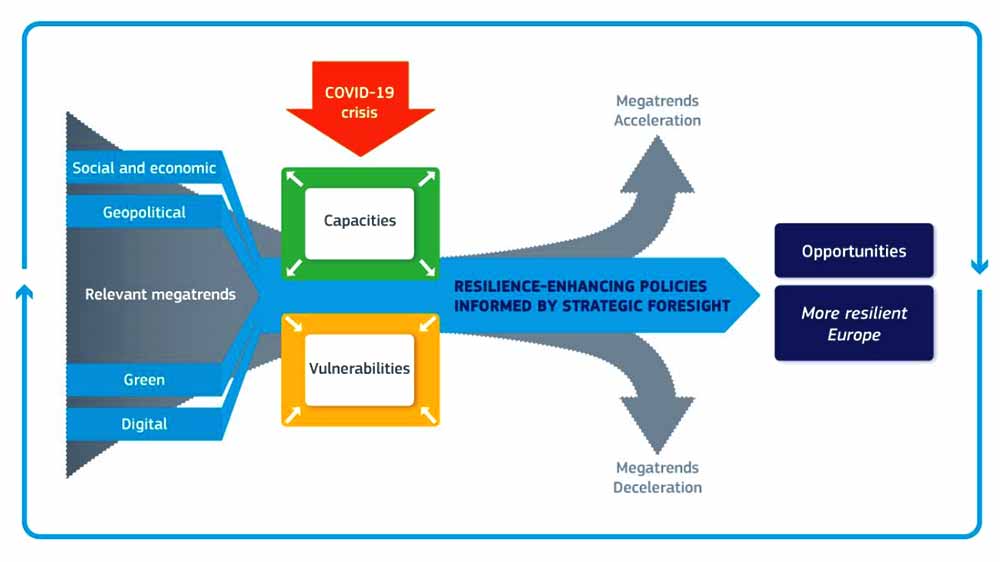
In these challenging times, political leaders have to look wide and far ahead.
Ursula von der Leyen, European Commission President
Ursula von der Leyen noted that this report shows the importance of resilience for a strong and lasting recovery. We aim to steer the necessary transitions in a sustainable, fair, and democratic manner.
Strategic Foresight and EU policy-making
Vice-President Maroš Šefčovič, in charge of interinstitutional relations and foresight, said: “The pandemic has not only thrown a sharp light on our vulnerabilities, but has presented opportunities that the EU cannot afford to miss. It has also reaffirmed the need to make our policies evidence-based, future-proof and centred on resilience. The first-ever Strategic Foresight Report therefore sets the scene for how we can make Europe more resilient. Resilience by boosting our open EU strategic autonomy and building a fairer, climate-neutral and digitally sovereign future.”
We cannot expect the future to become less disruptive – new trends and shocks will continue to affect our lives.
Maros Sefcovic, Vice-President
In light of the ambitious Recovery Plan for Europe, the 2020 Strategic Foresight Report considers EU resilience in four dimensions:
- Social and economic,
- Geopolitical,
- Green, and
- Digital.
For each dimension, the report identifies the capacities, vulnerabilities and opportunities revealed by the coronavirus crisis. We need them to be addressed in the medium- to long-term.
Foresight for better Strategic choices
This first annual Strategic Foresight Report, Strategic Foresight – Charting the course towards a more resilient Europe, presents the Commission’s strategy. EU aims to integrate strategic foresight into EU policy-making. Strategic Foresight Report identifies first lessons from the COVID-19 crisis. It introduces resilience as a new compass for EU policy-making and discusses the role in strengthening the resilience of the EU and its Member States. The report analyses resilience along four interrelated dimensions – social and economic, geopolitical, green and digital – and explains its importance for achieving our strategic long-term objectives in the context of the digital, green and fair transitions.
Initial mapping of Structural Risks facing the EU
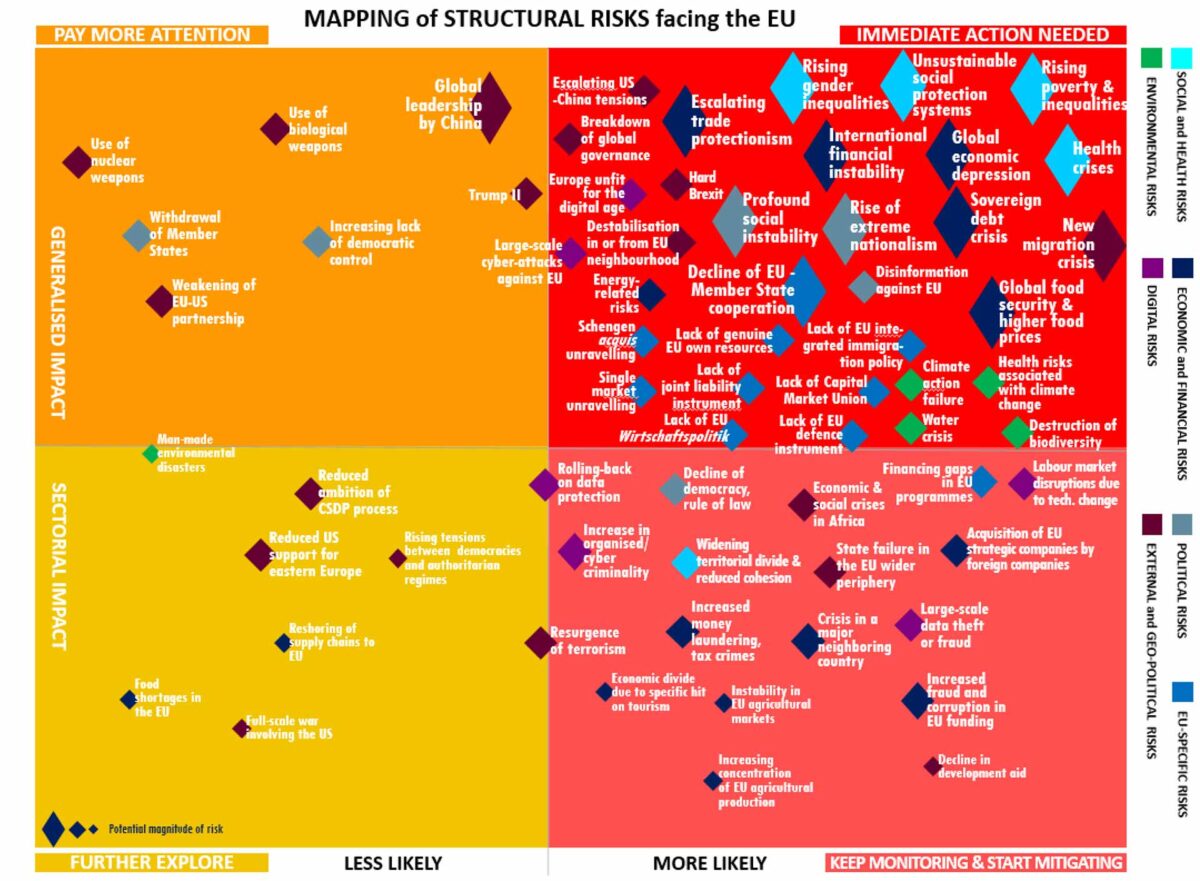
Embedding strategic foresight into the EU policy-making will enable the European Commission to:
- build and use collective intelligence to anticipate developments and prepare for new opportunities and challenges earlier and more effectively;
- ensure strategic foresight becomes an integral part of the Better Regulation toolbox, including ex ante impact assessments, and supports the Regulatory Fitness and Performance Programme;
- undertake in-depth and participatory foresight exercises on major initiatives aimed at informing the annual State of the Union address, Commission Work Programmes and multi-annual programming exercises;
- foster foresight cooperation and alliances with EU institutions and partners, Member States and other key stakeholders.
What is strategic foresight?
Foresight is the discipline of exploring, anticipating and shaping the future. It helps to build and use collective intelligence in a structured, systematic and systemic way, so as to anticipate developments. Strategic foresight seeks to embed foresight into European Union policy-making.
Foresight involves exploring scenarios, identifying trends and emerging issues. Strategic Foresight uses them to steer better-informed decisions, build dynamic policy coherence, and to act in the present in order to shape the future. Foresight looks towards the future from the present, and back – towards present actions from the future.
Resilience as a new compass for EU policies
The COVID-19 crisis has made clear that Europe needs to enhance its resilience. EU resilience is the ability not only to withstand and cope with challenges. It means also to undergo transitions in a sustainable, fair and democratic manner. This Communication shows how forward-looking policies supported by strategic foresight will contribute to this.
Strategic foresight can inform resilience-enhancing policies across four dimensions. It can help anticipate developments likely to have adverse impacts and to strengthen corresponding resilience through structural changes. Foresight takes into account the impact of current and future crises on relevant megatrends and emerging issues. Policies benefiting from strategic foresight can better mitigate the vulnerabilities. They can easier strengthen the capacities revealed by the crisis, opening new opportunities and making Europe more resilient.
Key findings
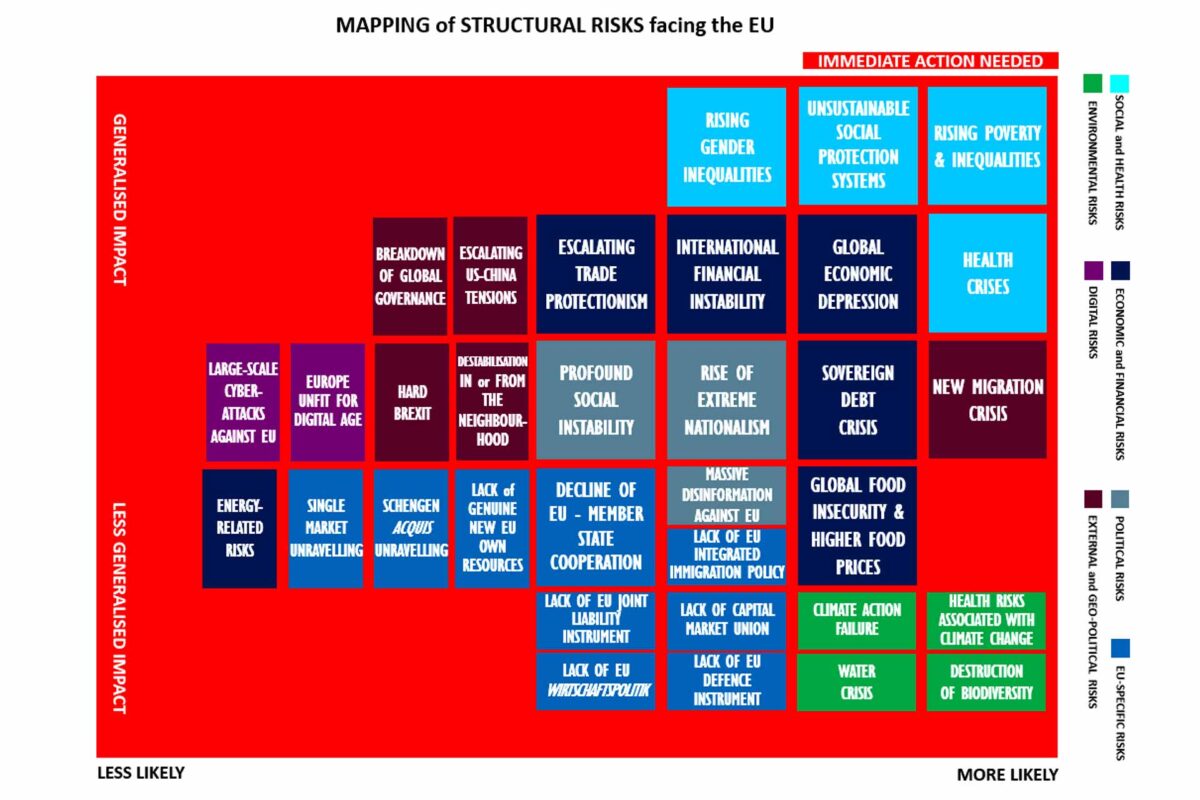
Social and economic resilience
The pandemic has deepened inequalities, increased demographic imbalances and poverty and accelerated automation. Coronavirus had a great disproportionate impact on service sector jobs. Strategic foresight can be used to identify the skills for the future that we need to invest in now. Strategic foresight works for a larger societal conversation about updating the social and fiscal contract.
Geopolitical resilience
The crisis has highlighted the EU’s over-reliance on third countries for critical raw materials crucial in key technologies needed to achieve a carbon-neutral and digital society. Strategic foresight can help identify possible scenarios and define strategic options to boost the EU’s open strategic autonomy.
Green resilience
A shift to a greener economy could create 24 million new jobs globally and its impact in the recovery from the COVID-19 crisis could be significantly larger than previously thought. Strategic foresight can help us explore the drivers of change, understand the future structural shift in the labour market and guide a reskilling of people who have lost their jobs during the crisis or who are likely to in the future due to technological developments and automation.
Digital resilience
The crisis has accelerated hyper-connectivity and the integration of new technologies affecting the human condition and the way we live. Strategic foresight can help us anticipate how key emerging technologies could develop, their impact on all spheres of life, and ways to seize upcoming opportunities.
Foresight really is not about the crystal ball
It’s true, some of my colleagues have been asking me if I can tell them what will be the next lotto numbers. Foresight really is not about the crystal ball. It’s about making sure we use the best scientific advice in where Europe could be, should be or want to be.
Maros Sefcovic, Vice-President-designate, Interinstitutional Relations and Foresight
Nico Semsrott German MEP: Question to Commissioner Maros Sefcovic
Strategic Foresight Agenda
The 2020 Strategic Foresight Report shows that action-driven strategic foresight is uniquely suited to inform decision-makers to drive the twin transitions and strengthen the EU’s resilience. For this purpose, this Communication presents as next steps:
- Prototype resilience dashboards as an example of a way of monitoring resilience. The prototype dashboards will be further developed and co-created in exploratory discussions with Member States and other key stakeholders. The focus of this work will be on the medium-to-long-term, to give the best conditions for foresight-informed policies to mitigate vulnerabilities and strengthen capacities.
- the Commission Strategic Foresight Agenda, supporting overarching political priorities. It will include ad-hoc foresight exercises to inform major initiatives planned in the Commission Work Programme as well as crosscutting issues identified as high impact. Examples could include: Open strategic autonomy, the future of green jobs and skills, and deepening the twinning of the green and digital transitions across all policies and strategies
- the annual ESPAS conference, planned for November 2020. The Commission will use this opportunity to discuss the topic of next year’s Strategic Foresight Report. The Commission also plans to use the ESPAS conference to launch an EU-wide Foresight Network with Member State public foresight capabilities, think tanks, academia, industry stakeholders and civil society
- Foresight scenarios to inform future policy debate, to ensure coherence across policies, and to serve as a shared, forward‑looking framework for policy proposals. These scenarios will help identify potential pathways for the twin transition. This exercise can also contribute to the Conference on the Future of Europe.
2020 Strategic Foresight Report
The 2020 Strategic Foresight Report proposes prototype resilience dashboards to kick‑start discussions among Member States and other key stakeholders on how best to monitor resilience. These discussions can help identify and assess strengths and weaknesses at EU and Member State level, in view of emerging megatrends and anticipated challenges.
It can help answer the following question: are we, through our policies and recovery strategy, making the EU more resilient?

